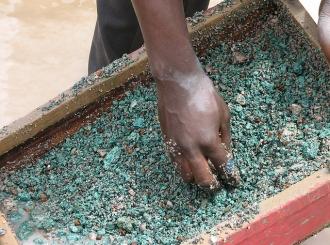
Lusaka, 15 September 2014 (ECA) - A group of women miners have requested the Economic Commission for Africa and UN Women to establish facilities to help them develop bankable projects. Making recommendations at a two day induction meeting in Lusaka, Zambia, the miners bemoaned the lack of affordable financing in what is a capital and labor intensive sector dominated by multi-national corporations. “We are struggling to be taken seriously by financial institutions because in most cases, we do not have bankable business proposals which banks demand. We therefore are appealing to ECA and UN Women to help us develop proposals that are bankable” read the recommendation.
Over 20 women miners drawn from across Zambia representing the associations for women in mining and artisanal mining convened in Lusaka from 9-10 September as part of the Gender and Mining in Africa project commissioned by ECA’s African Centre for Gender in partnership with the African Minerals Development Centre. The project seeks to strengthen the capacity and role of women in the mining sector and subsequently their participation and benefit in the economy.
In her opening remarks, Coordinator for ECA Africa Centre for Gender, Thokozile Ruzvidzo said that the participation of women in the economic sector and specifically the extractive industries was central to Africa’s structural transformation. “There is interplay between gender equality and Africa’s structural transformation and ECA has identified women entrepreneurship in the agriculture and extractive industries as priority.” she said.
Ruzvidzo said that the Gender and Mining project in Africa which includes a case study on Zambia, Tanzania, DRC, Ghana and Guinea-Conakry will review existing policy, legal and regulatory frameworks in the mining sector, to propose recommendations that integrate gender equality and equity in mining policies, laws, regulations, standards and codes in order to advance women’s economic participation and economic empowerment. The study will also examine a wide range of potential financing mechanisms for small-scale mining operations in order to up-scale them to commercial viability using a business model.
Access to affordable financing is the single biggest hindrance for women in mining. One of the miners, Getrude Mundia, owner of a 120 hectres aquamarine mine, said she had struggled to find financing since acquiring the license in 1988. “The nature of financial policy and systems are to support low risk short term projects, but the mining business is high risk, long term and capital intensive scaring off investors and financiers” said Mundia whose experience was repeated and echoed by all the miners. “We own mines, sit on gemstones, but we are still poor” added another miner who owns a 400 hector emerald, garnet and aquamarine in Eastern Zambia.
The African mining landscape is dominated and profited by huge multi-national corporations to the exclusion of majority of Africans, particularly women and young people. The launch of the AMDC in December 2013 in Mozambique was touted as a new page in the history and management the of the continent’s mineral wealth. The AMDC is mandated to implement the African Mining Vision which calls and foresees a mining sector that is safe, gender and ethnically inclusive, environmental friendly and socially responsible.
Issued by:
ECA External Communications and Media Relations Section
PO Box 3001
Addis Ababa
Ethiopia
Tel: +251 11 551 5826
E-mail: ecainfo@uneca.org